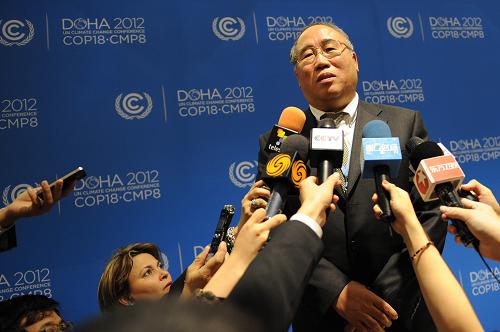Enterprises boost profile of China at Doha conference
 0 Comment(s)
0 Comment(s) Print
Print E-mail Xinhua, December 8, 2012
E-mail Xinhua, December 8, 2012
|
|
|
Xie Zhenhua, head of the Chinese delegation to the conference, answers questions. [Xinhua] |
Chinese enterprises demonstrated a green and low-carbon future to the world at the UN Climate Change Conference.
China has gained credit for its efforts to cope with climate change and push forward climate change negotiations during the conference, with Chinese corporations boosting the profile of China as a responsible developing country.
A set of activities, including forums, summits and meetings, at the China Pavilion offered Chinese enterprises platforms to introduce their recycling and low-carbon development initiatives.
Hisense, one of China's leading electronic information industry enterprises, shared its latest breakthroughs in green technology and innovations at the Sustainable Innovation Forum, held during the conference on behalf of Chinese corporations.
It was another chance for Hisense to improve Chinese corporations' image on the world stage after it became a corporate partner of the United Nations Environment Programme's SEED Award in 2011.
Committed to innovation and environmental protection, Hisense formulated the Green Design Standards for Hisense Products and the Green Development Outline several years ago to integrate environmental factors and eco-friendliness into its product design plans.
At a forum under the theme of South-South cooperation on climate change, Xie Zhenhua, head of the Chinese delegation to the conference, said the Chinese government had earmarked funds to strengthen South-South cooperation, which would be used to finance climate programs in Africa, the least developed countries and small island countries.
China also signed a memorandum with 10 developing countries this year to provide them with energy-efficient and low-emission products, including energy-saving lamps and air conditioners, said Xie, who is also deputy director of China's National Development and Reform Commission.
China Potevio and Haier Group, which participated in the project, were the first Chinese companies to donate LED lights to Ethiopia and Grenada, he said.
Xie said the energy-efficient products donated by China have already been delivered to Grenada and are expected to improve energy efficiency for the country's public sectors by 50 percent and save 1 million U.S. dollars per year in public energy consumption spending.
Tewolde Berhan, director-general of Ethiopia's Environmental Protection Authority, said China had helped his country make progress in improving energy efficiency, adding Ethiopia needed China's advanced energy-efficient technologies.
Wan Chuhui, a representative of Haier Group, said climate change was a major issue of concern for the international community.
During the UN Framework Convention on Climate Change (UNFCCC) last year in Durban, South Africa, China announced its South-South cooperation on climate change plan and Chinese companies should make more contributions to it, he said.
Wang Zhongfu, a representative of China Potevio, expressed his willingness to make efforts to improve developing countries' ability to deal with climate change through South-South cooperation.
Joint efforts by all sectors of society, including enterprises, were needed to cope with climate change, he said.
Though Chinese companies had limited funds and technologies and their own businesses to run, they were still willing to implement energy-saving and emission-reducing plans, Wang said.
Public opinion here was that Chinese companies had pushed forward international exchanges and cooperation in technology and promoted the goal of a low-carbon economy, demonstrating China was a responsible main developing country.







Go to Forum >>0 Comment(s)